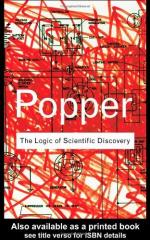
|
Inductive Method and Logic
These rely on experiences as the source of scientific theories, inferring universal statements from singular statements.
Empiricism
This relates to our experiences and is based on sense perceptions.
Deductive Method and Logic
These are used to derive singular statements from one or more universal statements together with initial conditions that apply to the statement in question.
Metaphysics
This is non-empirical and uses other factors to extend this definition to include the meaningless and nonsensical.
Positivist
This is one who approaches scientific questions from the point of view that everything that counts as knowledge lies in empirical statements.
Probability
This is described as frequencies that can be explained by series of events.
Cosmology
This is the study of the universe.
Conventionalism
This is a theory that clings to the idea of simple, basic laws of nature which are created in the human mind and serve...
(read more Object Descriptions)
|
This section contains 288 words (approx. 1 page at 300 words per page) |

|




